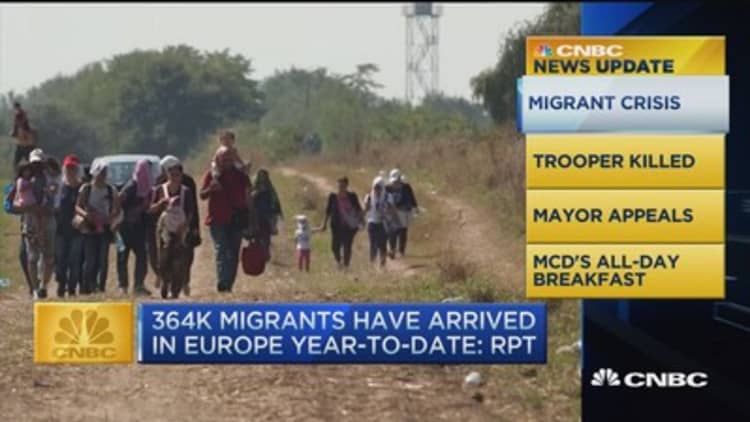European Commission officials are debating a proposal that would allow some EU countries to pay money in order to opt out of a mandatory quota system for accepting refugees, in a plan that could ease a stand-off between eastern and western members over how to relieve Europe's migrant crisis.
Some eastern states have balked at being forced to accept mandatory numbers, under a plan to divide 160,000 migrants across the region to be announced on Wednesday by commission president Jean-Claude Juncker. They argue that voluntary targets allow member states to provide better care to people looking to settle in Europe.
"We are ready to share the burden and take responsibility, but only if we have control over the situation," said Poland's minister for Europe, Rafal Trzaskowski.
Over the summer a harrowing exodus of people from the Middle East, Africa and Afghanistan has leapt to the top of Europe's political agenda, and led to a quadrupling of the EU's resettlement target from 40,000 people in July.
Commission officials and eastern diplomats stressed that the plan would only allow countries to take temporary "time-outs" from any expanded quota regime, in exchange for payments to a fund supporting refugees.

"It creates an opportunity for voluntary decision making," said an eastern EU official. "If they do it with penalties, then that is a bad idea. But if there is a system where you contribute financially to helping the problem in a different way, then that is much more palatable."EU officials stressed that any opt-out would also have to be justified by "objective reasons" — for example Poland's desire to have contingency plans in place to accept large numbers of refugees from Ukraine if the conflict there worsens. Talks on the proposal will continue on Monday and Tuesday, officials said.
The stand-off over quotas has led to spiky rhetoric between western states, led by Germany, and eastern states such as Hungary and Poland. They argue that inflexible targets do not allow countries to fully care for incoming migrants, and feel unfairly criticised by their western partners.
More from the Financial Times:
Pope calls for parishes to house migrants
Juncker's EU migrants plan takes shape
UK aid budget to target migrant crisis
"We are standing in solidarity with Europe, but responsibly, by maintaining some control over the process," said Mr Trzaskowski. "Mandatory quotas do not allow for that."
He added: "We want to create conditions so that people will want to stay here in Poland and become part of our society. Mechanically processed, mandatory quotas throw that into doubt, and are counter-productive."
The talks over how to ease the quota impasse took place as German chancellor Angela Merkel's liberal stance on refugees came under pressure from allies in her conservative bloc, who warned that Germany "cannot accomplish this alone".
As thousands more refugees arrived in Germany, the EU's most vocal proponent of additional support, the Christian Social Union — the Bavarian sister party of Ms Merkel's Christian Democrats — criticised the decision to let migrants in from Hungary as "the wrong decision".
Read MoreAustria to end 'open border' emergency measures
Germany expects to take in as many as 800,000 migrants this year, and the wealthy southern state of Bavaria lies at the northern end of the Balkan migrant trail which has overtaken the Mediterranean as the most popular route for migrants travelling to Europe.
Among those heading for Germany via Austria on Sunday was Ghyath Al Dabbagh, a 25-year old electrician from Damascus, who left Syria for Lebanon two years ago and arrived in Hungary on Friday.
In the early hours of Sunday morning, his train carrying roughly 500 other migrants, was greeted in Vienna West station by crowds of cheering locals, who distributed food and clothing. By early afternoon, Mr Al Dabbagh was on a second train bound for Munich.
"I never want to go back to Syria again. Coming to Germany, I feel like I'm coming home, really. The Germans are good people and Angela [Merkel] loves Syrians — that's why she has welcomed us," he said.

